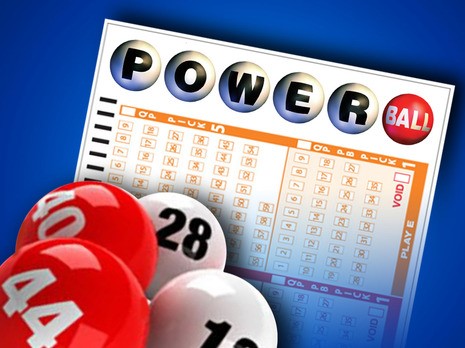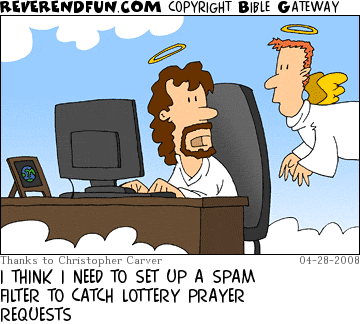
Playing the lottery is one of those areas where we wish we had a clear-cut verse (“Thou shalt not play the lottery” or on the flipside, “Blessed are the lottery players”), but we really don’t. We have, as Scripture often gives us, precepts with which to shape our conviction and practice.
To Play:
Yes, $1.5 billion (current estimated jackpot) would sure wipe out the need for any future car washes. The tithe alone could endow several churches and ministries. Or so we tell ourselves as we contemplate whether to buy a Powerball ticket.
Of course, if you were to win the Powerball jackpot, you would have to believe that the riches came from divine appointment, given the 1 in 292.2 million chance you’d have of winning. In a recent USA Today online article, it was noted that, roughly speaking, the chances of picking the right combination of numbers is like flipping a coin and getting heads 28 times in a row, according to Jeffrey Miecznikowski, an associate professor of biostatistics at the University at Buffalo in New York. That sounds like more of a longshot than other comparisons we’ve heard such as being struck by lightning or bitten by a shark.
It’s fun to fantasize about what we’d do with a billion bucks. And to be clear, there is nothing wrong with wealth at face value. Job, described as “blameless and upright,” was a man of great wealth. Abraham was described as “very wealthy in livestock and in silver and gold.” The Good Samaritan, the star of the parable that bears his name, was certainly a person of wealth and resource.
So, if you’re looking for some Bible backing to pick up that ticket, the wealth itself isn’t an issue. But…
Not to Play:
One particular proverb, however, poignantly and interestingly sums up issues related to wealth and quickly gotten gain. It’s a request you don’t often see in Scripture, made by a sage named Agur, likely a student of wisdom during the time of Solomon.
7 Two things I ask of you, Lord; do not refuse me before I die: 8 Keep falsehood and lies far from me; give me neither poverty nor riches, but give me only my daily bread. 9 Otherwise, I may have too much and disown you and say, ‘Who is the Lord?’ Or I may become poor and steal, and so dishonor the name of my God” (Proverbs 30:7-9)
It’s the second request of Agur that strikes a financial chord. It’s a curious request: God, keep me between the extremes. You might call it the Goldilocks Proverb. And then Agur goes on to explain why he wants the mid-range of riches.
Adopting the Proverbs 30 prayer seems to disqualify oneself from Powerball in that we can be certain that $1.5 billion doesn’t qualify for “only my daily bread.” It’s a lifetime supply of bread. Several lifetimes, actually. The consequence feared by Agur was that he would fall away from God as a result of riches. With a Powerball payout coming our way we’d certainly have less of a need to trust God for our daily bread, which even lops off a key request from the prayer that Jesus taught us to pray. Of course that doesn’t keep us from saying to God, “Try me. Give me a chance to show you that I can win the Powerball and still depend on you.”
It’s probably fair to say that to win a monster Powerball jackpot is to lessen your dependence on God, not only for daily bread, but for anything else gained through finances. So, then, here might be the question: Is quickly-gotten wealth worth risking your dependence on God, a key pillar in your relationship with God?
In fact, the writer of Hebrews sums up the equation nicely for us:
Keep your lives free from the love of money and be content with what you have, because God has said, “Never will I leave you; never will I forsake you.” (Hebrews 11:5)
With those precepts, I leave you to your own convictions and practice. And with a funny.
